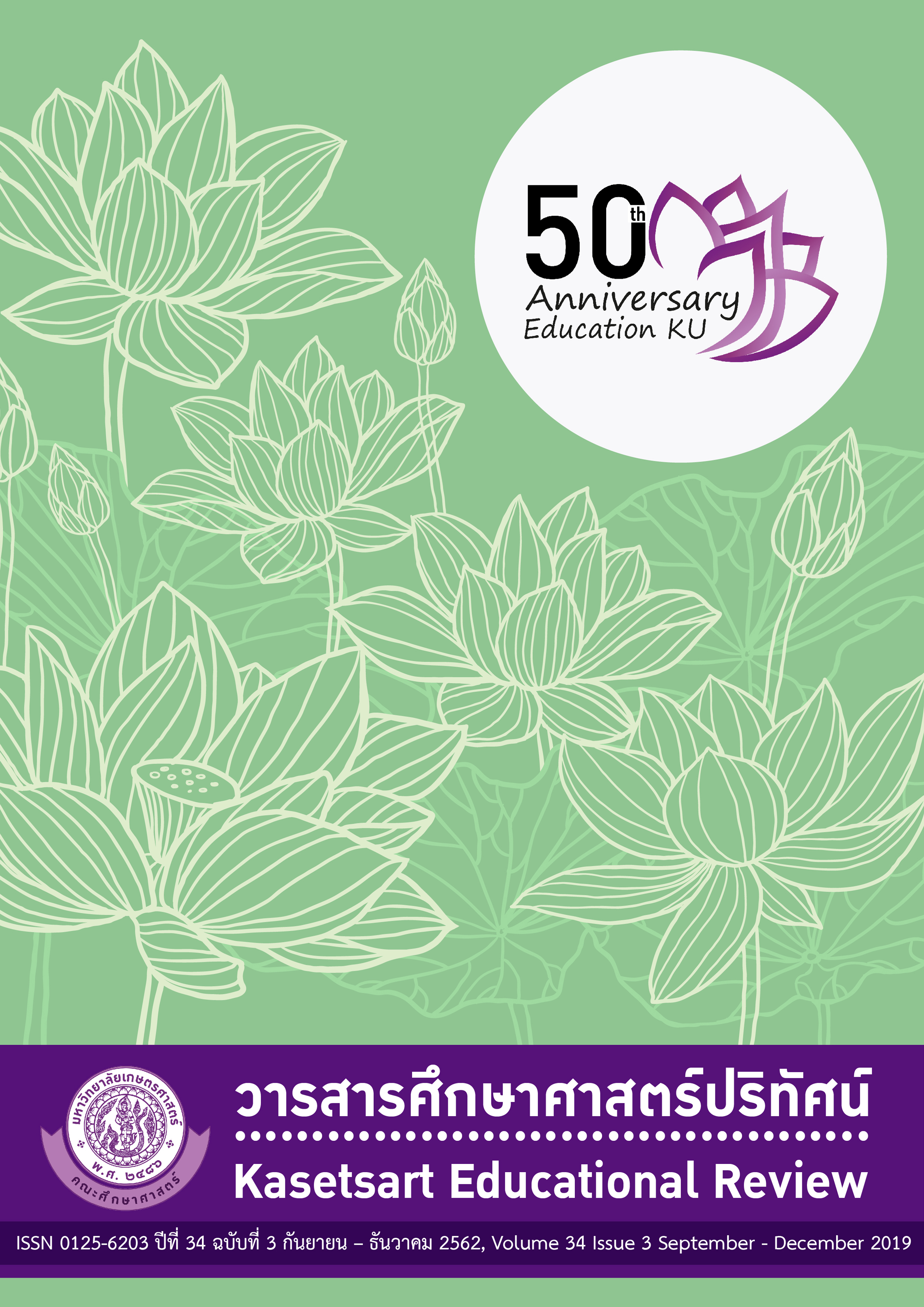ผลการจัดการเรียนรู้แบบสืบเสาะหาความรู้ (5E) ผนวกเทคนิค KWL Plus ที่มีต่อผลสัมฤทธิ์ทางการเรียนวิชาวิทยาศาสตร์และความสามารถในการคิดวิเคราะห์ ของนักเรียนชั้นประถมศึกษาปีที่ 2 กลุ่มโรงเรียนภาชีระพีพัฒน์ จังหวัดพระนครศรีอยุธยา
คำสำคัญ:
การจัดการเรียนรู้แบบสืบเสาะหาความรู้ (5E), เทคนิค KWL Plus, ผลสัมฤทธิ์ทางการเรียนวิชาวิทยาศาสตร์, ความสามารถในการคิดวิเคราะห์, ประถมศึกษาบทคัดย่อ
การวิจัยในครั้งนี้มีวัตถุประสงค์เพื่อ (1) เปรียบเทียบผลสัมฤทธิ์ทางการเรียนวิชาวิทยาศาสตร์ ของนักเรียนชั้นประถมศึกษาปีที่ 2 ที่ได้รับการจัดการเรียนรู้แบบสืบเสาะหาความรู้ (5E) ผนวกเทคนิค KWL Plus กับเกณฑ์ร้อยละ 75 และ (2) เปรียบเทียบความสามารถในการคิดวิเคราะห์ของนักเรียนชั้นประถมศึกษาปีที่ 2 ที่ได้รับการจัดการเรียนรู้แบบสืบเสาะหาความรู้ (5E) ผนวกเทคนิค KWL Plus ระหว่างก่อนและหลังเรียน
กลุ่มตัวอย่างที่ใช้ในการวิจัยเป็นนักเรียนชั้นประถมศึกษาปีที่ 2 โรงเรียนวัดนาอุ่น ซึ่งอยู่ในกลุ่มโรงเรียนภาชีระพีพัฒน์ 1 ห้องเรียน จำนวน 14 คน ซึ่งได้มาโดยการสุ่มแบบกลุ่ม เครื่องมือที่ใช้ในการวิจัย ครั้งนี้ คือ แผนการจัดการเรียนรู้แบบสืบเสาะหาความรู้ (5E) ผนวกเทคนิค KWL Plus เรื่องวัสดุรอบตัวเรา แบบทดสอบวัดผลสัมฤทธิ์ทางการเรียนวิชาวิทยาศาสตร์ เรื่องวัสดุรอบตัวเรา และแบบวัดความสามารถในการคิดวิเคราะห์ สถิติที่ใช้ในการวิเคราะห์ข้อมูล ได้แก่ ค่าร้อยละ ค่าเฉลี่ย ส่วนเบี่ยงเบนมาตรฐานและการทดสอบค่าเครื่องหมาย
ผลการวิจัยปรากฏว่า (1) คะแนนเฉลี่ยผลสัมฤทธิ์ทางการเรียนวิชาวิทยาศาสตร์ ของนักเรียนชั้นประถมศึกษาปีที่ 2 ที่ได้รับการจัดการเรียนรู้แบบสืบเสาะหาความรู้ (5E) ผนวกเทคนิค KWL Plus หลังเรียนสูงกว่าเกณฑ์ร้อยละ 75 อย่างมีนัยสำคัญทางสถิติที่ระดับ .05 (2) ความสามารถในการคิดวิเคราะห์ของนักเรียนชั้นประถมศึกษาปีที่ 2 ที่ได้รับการจัดการเรียนรู้แบบสืบเสาะหาความรู้ (5E) ผนวกเทคนิค KWL Plus หลังเรียนสูงกว่าก่อนเรียน อย่างมีนัยสำคัญทางสถิติที่ระดับ .05
เอกสารอ้างอิง
Carin, A. and Sund, R. (1975). Teaching science through discovery. Columbus: Charles E. Merrill.
Carr, E. and Ogle, D. (1987). K-W-L Plus: A strategy for Comprehension and Summarization. Journal of Reading, 30 (April 1987), 626-631.
Chaowakeratipong, N. (2014). Definition and scope of analytical thinking. in Paitoon Sinlarat (Editor), Analytical thinking: how to teach and create (pages 8-17). Bangkok: Chulalongkorn University Printing Press. [in Thai]
Chindanuruk, T. (2014). Assessment of analytical thinking. in Paitoon Sinlarat (Editor), Analytical thinking: how to teach and create (pages 42-55). Bangkok: Chulalongkorn University Printing Press. [in Thai]
Kanchanarukphong, S. (2006). Techniques for organizing 5E learning activities that focus on developing advanced thinking skills: Learning Area of Science. Bangkok: Tarn aksorn. [in Thai]
Khemmani, T. (2016). Teaching science: knowledge for organizing effective learning processes. Bangkok: Chulalongkorn University Printing Press. [in Thai]
Laowreandee, W. (2013). Thinking skills instruction models and stratrgies. Nakhon Pathom: Faculty of Education Silpakorn University Sanamchan Palace Campus. [in Thai]
Lindratanasirikul, K. (2017). Research tools and quality inspection. In Academic department publisher (Editor ), Research in Curriculum and Instruction Unit 8-11 (pages 1-82). Nonthaburi: Department of Education Sukhothai Thammathirat Open University. [in Thai]
Ministry of Education (MOE). (2008). The Basic Education Core Curriculum, BE 2008. Bangkok: Teachers Council of Ladprao. [in Thai]
Ministry of Education (MOE).(2017). Learning standards and indicators for learning mathematics Science and Geography In the group of learning, social studies, religion and culture (Revised version 2017) according to the core curriculum of basic education, BE 2008. Bangkok: Teachers Council of Ladprao. [in Thai]
Sinlarat, P. (2014). Importance and necessity of analytical thinking. In Paitoon Sinlarat (Editor), Analytical thinking: how to teach and create (pages 1-7). Bangkok: Chulalongkorn University Printing Press. [in Thai]
Sinthaphanon, S. (2015). Learning management of modern teachers To develop skills of learners in the 21st century. Bangkok: 9119 Limited Partnership Technical Printing. [in Thai]
Sintoovongse, K. and Visavateeranon, S. (2014). Psychological basis of science teaching. In Academic department publisher (Editor), Foundations Methodologiesand Nature of Science Education Unit 6-10 (pages 1-140). Nonthaburi: Department of Education Sukhothai Thammathirat Open University. [in Thai]
Tejagupta, C. (2012). Child Development Psychology. In Academic department publisher (Editor), Phychology and learning methodology Unit 1-7 (pages 1-46). Nonthaburi: Department of Education Sukhothai Thammathirat Open University. [in Thai]
The Institute for the Promotion of Teaching Science and Technology (IPST). (2018). What are the implications of scientific knowledge from PISA. FOCUS issues from PISA. from https://pisathailand.ipst.ac.th/issue-2018-30/. [in Thai]
Yok-ubon, N. (2012). How to think through a scientific mind. Nonthaburi: Bookpoint. [in Thai]
ดาวน์โหลด
เผยแพร่แล้ว
ฉบับ
ประเภทบทความ
สัญญาอนุญาต
บทความทุกบทความเป็นลิขสิทธิ์ของวารสารคณะศึกษาศาสตร์ มหาวิทยาลัยเกษตรศาสตร์ วิทยาเขตบางเขน
วารสารศึกษาศาสตร์ปริทัศน์ (Kasetsart Educational Review)






